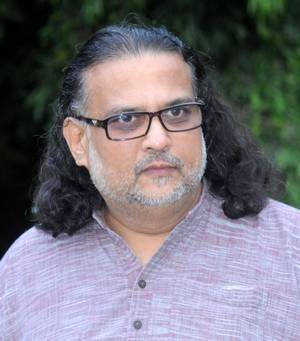ALIGARH (UP): Noted author and great-grandson of Mahatma Gandhi, Tushar Gandhi Tuesday said the social conflict cannot end unless the forces having vested interest in creating it cease to exist.
There can be no peace in the world as long as the military-armament industry continues to call the shots in global affairs, he said, adding this industry would collapse if there is peace in the world.
Gandhi made the remarks while delivering his keynote address at a seminar on Gandhian Perspective on Alternative Dispute Resolution at the Aligarh Muslim University here.
It is the downtrodden, common people of the world who pay the price for the greed of power-brokers and the manufacturers of armaments, he said.
Referring to the internal peace in the country, Gandhi said, “There are forces at work which thrive by creating internal conflicts in the country and as long as there are political forces which gain mileage out of conflicts, the country can never be at peace.”
He said India will truly become a nation when all these conflicts between different sections of the society are resolved and the people work together for a common cause.
Touching upon the ongoing conflict at the Sabarimala Temple in Kerala , Gandhi said it was not the real ‘bhakts’ (devotees) of the Sabarimala deity who are at the forefront of this imbroglio.
It is being fuelled by those who seek political mileage out of this conflict, he said.
Calling upon the younger generation of the country to take up the challenge of resolving the internal conflicts presently plaguing the Indian society, Gandhi said it is for the youths to realise the importance of destroying the “seeds of conflict and hate” because it is their generation which will have to face the brunt of such conflicts.
“Our generation has failed in dousing the fire of these conflicts,” he rued.
Gandhi said such conflicts between different sections of the people are allowed to simmer and grow by the falsified historical facts.
He said Gandhiji was assassinated because the killers were fed on the myth that he had wrongly pressurised the then Indian government to give Rs 50 crore to Pakistan.
“This is a prime example of how facts are twisted and conflicts bred. It is an established historical fact that these 50 crore rupees were given to Pakistan as per an Indo-Pak treaty of which the division of assets was an essential part. The treaty was signed by the prime ministers of both the countries and Gandhiji was nowhere in the picture,” he said.
He said his great grandfather came into the picture much later when he found that the Indian government was dithering on this agreement between two sovereign states.
Mahatama Gandhi strongly felt that if the foundation of India as a newborn sovereign state was laid on an act of immorality then the consequences of this would cast a shadow on India’s moral high ground for generations to come, he said.
The assassins of Gandhiji were fed on the lies perpetuated by the forces which had a political vested interest in spreading the ill will between different people, he stressed.
The great grandson of the Father of Nation said the present judicial system was unable to deliver justice to the common people because the law often does not take into consideration the inability of the poorest and vulnerable sections to bear the cost and endure the time involved in dispensation of justice.
He said it was, therefore, important that an alternative mechanism for resolving disputes through low-cost arbitration is evolved for quick dispensation of justice.
The two-day seminar has been jointly organized by the Department of Philosophy, AMU, Indialogue Foundation, New Delhi and the Gandhi Smriti and Darshan Samiti. (AGENCIES)


